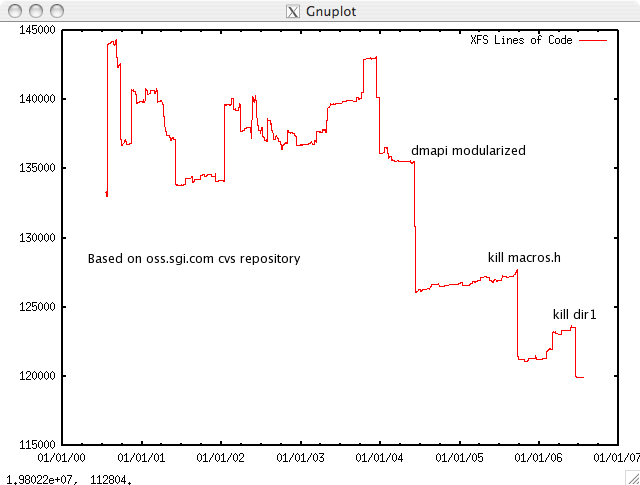Step 1: Fame
Totally awesome day! I submitted Unionfs to the usual places (linux-kernel, fsdevel, and the key people), then I stayed up all night. In the morning, I got a form for permission to enroll in the graduate version of compilers (I’d much prefer lex & yacc to some made up java thing the undergrad course uses). At around 10, I decided to head home and get some sleep. I woke up about 8 hours later, and checked my email. I replied to a lot of comments/questions by Andrew Morton and some other people, and when I finally managed to check the rest of the inbox, I saw:
Jan 08 akpm@osdl.org ( 236) + unionfs-documentation.patch added to -mm tree Jan 08 akpm@osdl.org ( 107) + lookup_one_len_nd-lookup_one_len-with-nameidata-argument.patch added to -mm Jan 08 akpm@osdl.org ( 138) + unionfs-branch-management-functionality.patch added to -mm tree Jan 08 akpm@osdl.org ( 649) + unionfs-common-file-operations.patch added to -mm tree Jan 08 akpm@osdl.org ( 733) + unionfs-copyup-functionality.patch added to -mm tree Jan 08 akpm@osdl.org ( 299) + unionfs-dentry-operations.patch added to -mm tree Jan 08 akpm@osdl.org ( 313) + unionfs-file-operations.patch added to -mm tree Jan 08 akpm@osdl.org ( 319) + unionfs-directory-file-operations.patch added to -mm tree Jan 08 akpm@osdl.org ( 326) + unionfs-directory-manipulation-helper-functions.patch added to -mm tree Jan 08 akpm@osdl.org ( 995) + unionfs-inode-operations.patch added to -mm tree Jan 08 akpm@osdl.org ( 572) + unionfs-lookup-helper-functions.patch added to -mm tree Jan 08 akpm@osdl.org ( 743) + unionfs-main-module-functions.patch added to -mm tree Jan 08 akpm@osdl.org ( 344) + unionfs-readdir-state.patch added to -mm tree Jan 08 akpm@osdl.org ( 501) + unionfs-rename.patch added to -mm tree Jan 08 akpm@osdl.org ( 263) + unionfs-privileged-operations-workqueue.patch added to -mm tree Jan 08 akpm@osdl.org ( 168) + unionfs-handling-of-stale-inodes.patch added to -mm tree Jan 08 akpm@osdl.org ( 228) + unionfs-miscellaneous-helper-functions.patch added to -mm tree Jan 08 akpm@osdl.org ( 402) + unionfs-superblock-operations.patch added to -mm tree Jan 08 akpm@osdl.org ( 233) + unionfs-helper-macros-inlines.patch added to -mm tree Jan 08 akpm@osdl.org ( 552) + unionfs-internal-include-file.patch added to -mm tree Jan 08 akpm@osdl.org ( 87) + unionfs-include-file.patch added to -mm tree Jan 08 akpm@osdl.org ( 218) + unionfs-unlink.patch added to -mm tree Jan 08 akpm@osdl.org ( 109) + unionfs-kconfig-and-makefile.patch added to -mm tree
Unionfs is now in -mm!
If you actually look at the next -mm changelog, you only see one patch containing all of Unionfs, as Andrew decided to use the git tree that I set up (gitweb) on kernel.org.

